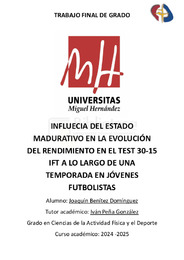Por favor, use este identificador para citar o enlazar este ítem:
https://hdl.handle.net/11000/37093Registro completo de metadatos
| Campo DC | Valor | Lengua/Idioma |
|---|---|---|
| dc.contributor.advisor | Peña-González, Iván | - |
| dc.contributor.author | Benítez Domínguez, Joaquín | - |
| dc.contributor.other | Departamentos de la UMH::Ciencias del Deporte | es_ES |
| dc.date.accessioned | 2025-07-31T08:11:27Z | - |
| dc.date.available | 2025-07-31T08:11:27Z | - |
| dc.date.created | 2025-06 | - |
| dc.identifier.uri | https://hdl.handle.net/11000/37093 | - |
| dc.description.abstract | El presente trabajo analiza la influencia del estado madurativo en la evolución del rendimiento en el test 30-15 IFT (VIFT) a lo largo de una temporada en jóvenes futbolistas. Participaron 350 jugadores masculinos de categorías infantil y cadete. Se realizaron cuatro mediciones durante la temporada, incluyendo variables antropométricas y la prueba 30-15 ift. El estado madurativo se estimó mediante la fórmula de mirwald et al. (2002), agrupando a los jugadores en pre, mid y post-phv. el test 30-15 ift se utilizó como medida de la capacidad de esfuerzo intermitente. Los resultados pretenden aportar evidencia sobre cómo el desarrollo biológico puede condicionar no solo el rendimiento inicial, sino también su evolución durante la temporada, contribuyendo así a una planificación del entrenamiento más ajustada a la etapa madurativa del jugador. | es_ES |
| dc.description.abstract | The present work analyzes the influence of biological maturation on the evolution of performance in the 30-15 IFT (VIFT) over the course of a season in youth football players. A total of 350 male players from u13 and u15 categories participated. Four assessments were carried out throughout the season, including anthropometric variables and the 30-15 ift. maturity status was estimated using the mirwald et al. (2002) equation, classifying players into pre-, mid-, and post-phv groups. the 30-15 ift was used as a measure of intermittent fitness capacity. The findings aim to provide evidence on how biological development may condition not only initial performance but also its progression during the season, supporting more effective training planning according to each player’s maturational stage. | es_ES |
| dc.format | application/pdf | es_ES |
| dc.format.extent | 7 | es_ES |
| dc.language.iso | spa | es_ES |
| dc.publisher | Universidad Miguel Hernández | es_ES |
| dc.rights | info:eu-repo/semantics/openAccess | es_ES |
| dc.rights | Attribution-NonCommercial-NoDerivatives 4.0 Internacional | * |
| dc.rights.uri | http://creativecommons.org/licenses/by-nc-nd/4.0/ | * |
| dc.subject | Estado madurativo | es_ES |
| dc.subject | VIFT | es_ES |
| dc.subject | 30-15 IFT | es_ES |
| dc.subject | Fútbol base | es_ES |
| dc.subject | Resistencia intermitente | es_ES |
| dc.subject | Pico de velocidad de crecimiento (PHV) | es_ES |
| dc.subject.other | CDU::7 - Bellas artes::79 - Diversiones. Espectáculos. Cine. Teatro. Danza. Juegos.Deportes | es_ES |
| dc.title | Influencia del estado madurativo en la evolución del rendimiento en el test 30-15 IFT a lo largo de una temporada en jóvenes futbolistas | es_ES |
| dc.type | info:eu-repo/semantics/bachelorThesis | es_ES |

Ver/Abrir:
TFG BENITEZ DOMINGUEZ, JOAQUIN.pdf
370,95 kB
Adobe PDF
Compartir:
 La licencia se describe como: Atribución-NonComercial-NoDerivada 4.0 Internacional.
La licencia se describe como: Atribución-NonComercial-NoDerivada 4.0 Internacional.
.png)